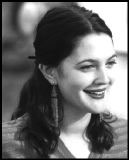RIDING IN CARS WITH BOYS
directed by Penny Marshall with Drew Barrymore, Steve Zahn, James Woods, and Brittany Murphy opens Oct. 19 at Metro, Oak Tree, Pacific Place, and others
A LEADING ACTRESS for practically her entire life, Drew Barrymore has reached the point in her career where supply and demand happily converge. Growing out of her cute kid and teen sexpot roles, she’s remade herself as an able comedienne, as last year’s Charlie’s Angels proved. Maybe, like Legally Blonde‘s Reese Witherspoon, she’s discovered that with serious women’s parts in short supply in Hollywood, it’s better to take the goofball’s path.
For a while, then, Riding in Cars with Boys cruises along briskly in conveying the true life story of one Beverly Donofrio, a Connecticut cop’s daughter who gets knocked up at the tender age of 15. It’s 1965, and Penny Marshall clearly relishes the kitsch and period touches, from garish Christmas decorations to crinoline dresses to desultory wedding receptions where macaroni salad is served by the heaping, gloppy spoonful. The movie’s enjoyably grounded in real, remembered detail during these early sequences, as if the 59-year-old director of Big and A League of Their Own were calling on some of her own personal experiences.
Barrymore embodies our heroine from 15 to 35, and does a darn good job of it, too. Forced to wed her ne’er-do-well boyfriend (Joy Ride‘s Steve Zahn in full mouth-breather mode), she endures the disapproval of father and mother (James Woods and Lorraine Bracco) while clinging to her best friend (Don’t Say a Word‘s Brittany Murphy).
Unfortunately dread narrative necessity forces Marshall to march through the next 20 years of Bev’s tumultuous life. She’s yoked to a script that clumsily tells most of the story in flashbacks from 1986, with narration jarringly provided by Bev’s now 20-year-old son (Australian Adam Garcia of Coyote Ugly)—instead of by the author herself! (You wish Marshall would simply stay in one concrete, colorful place and time, like Barry Levinson in Baltimore.)
By midfilm, Riding bogs down into predictable melodramatic complication, with obstacles conveniently placed at every path to Bev’s inevitable vindication. (Meanwhile, Barrymore’s liveliness is smothered by hugs, tears, and reconciliation.) Mother and son have Issues To Deal With, as do daughter and father, wife and ex-husband, and so forth. Riding could easily fill an entire week of daytime TV talk shows with such sentimental scenes of confrontation and forgiveness. To their credit, Marshall and Barrymore make Bev a far from perfect heroine, but her foibles feel like sitcom quirks and her triumph rings like a bittersweet sweeps week finale.








